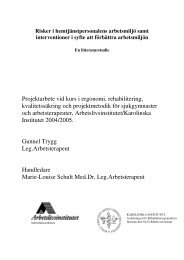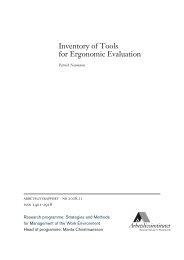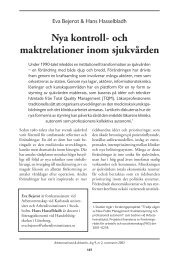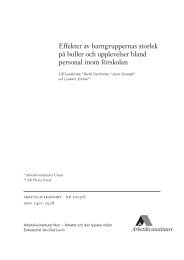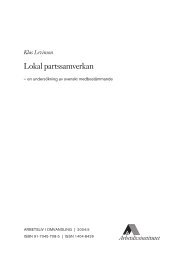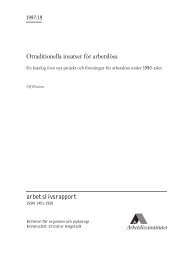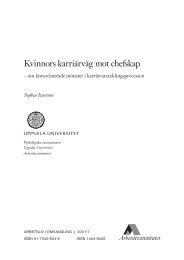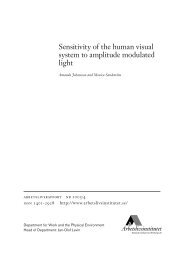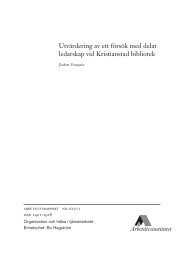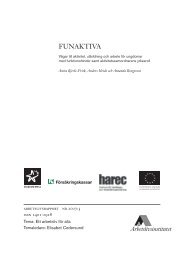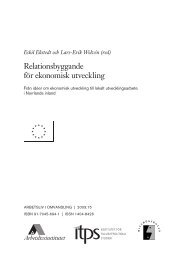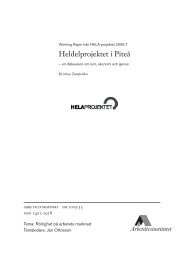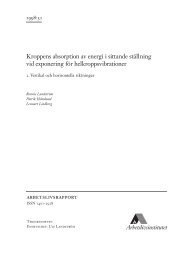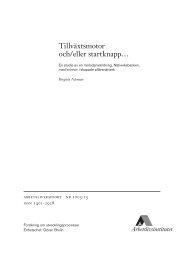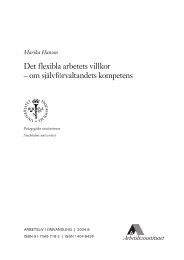Auktoritet och ansvar: Lärares fostrans- och omsorgsarbete i ... - DiVA
Auktoritet och ansvar: Lärares fostrans- och omsorgsarbete i ... - DiVA
Auktoritet och ansvar: Lärares fostrans- och omsorgsarbete i ... - DiVA
You also want an ePaper? Increase the reach of your titles
YUMPU automatically turns print PDFs into web optimized ePapers that Google loves.
English summary: Discipline and care<br />
The aim of this study is to investigate ways in which the teaching profession has<br />
changed during the 20 th century regarding two aspects: discipline/moral education<br />
and care. These two aspects are intertwined in many ways but their principal<br />
object differs. Discipline/moral education has the norm-breaking child as its<br />
main problem, whereas care has the suffering child as its main problem.<br />
Taking these two aspects of teachers’ work as a point of departure, several<br />
themes are investigated that in different ways deal with the changing role of<br />
teachers.<br />
The theoretical framework can be described as a mix of the history of mentalities,<br />
theories of modernity and theories of modern institutions. In order to describe<br />
the meanings of work, it is essential to take into consideration how this<br />
work is shaped by, and understood, in terms of ideas, opinions and attitudes.<br />
Focusing on both the present and the past, the aim is to put the present into perspective<br />
by showing the ways in which it differs from the past. In explaining and<br />
describing change a focus is laid on the institutional features of schooling. While<br />
recognizing the relevance of perspectives that emphasize the relationship between<br />
school and society, this study is primarily focused on school as a society in<br />
itself. The empirical material consists of handbooks for teachers, journals and<br />
magazines for teachers, interviews, life histories, commission reports, novels,<br />
school memories etcetera.<br />
The two aspects of teaching analysed in this study, discipline and care, are<br />
treated in two separate parts. Both parts consist of three main chapters where the<br />
main findings are presented, and one concluding chapter.<br />
Chapter 4 [“The struggle against the lie”] is about the lying school child. In<br />
the 19th century and in the first half of the 20 th century lies were often seen as a<br />
great discipline problem. Starting with an exposé on how the lie has been held to<br />
be problematic, the question is raised about why the lie was seen to be such a<br />
severe problem. It is argued that the lie posed a problem for a panoptic discipline<br />
that viewed visibility as being of paramount importance. It is further argued that<br />
the lying school child was also supposed to commit other immoral acts. Since the<br />
lie was seen as a problem, it is of no big surprise that it was subject to various<br />
problem solving strategies. Some thought that the lie should be punished away,<br />
but this idea was criticised on the grounds that the punishment could be counter<br />
productive, i.e. producing lies instead of defeating lies. An alternative to punishment<br />
was to make pupils confess their sins. The thesis of the chapter is that the<br />
lie has lost its relative importance as a central problem in the disciplining of the<br />
young. Three explanations for this change are put forth (1) Behavioural problems<br />
of today tend often to be “open” instead of hidden, making honesty rather than<br />
225



